|
|
|
Sort Order |
|
|
|
Items / Page
|
|
|
|
|
|
|
| Srl | Item |
| 1 |
ID:
137570
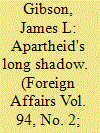

|
|
|
|
|
| Summary/Abstract |
Last April, South Africa celebrated the 20th anniversary of its first democratic elections, which brought to power the African National Congress (ANC) and its leader, Nelson Mandela, who had led the antiapartheid movement for decades. Many had long believed that civil war was the only way that the apartheid state would fall, and South Africa’s mostly peaceful transition from a racist authoritarian state to a multiracial democracy stands as one of the most surprising political developments of the twentieth century. The shift has not been without its problems, but few would contest South Africa’s credentials as a democracy—perhaps the most democratic state in Africa.
|
|
|
|
|
|
|
|
|
|
|
|
|
|
|
|
| 2 |
ID:
137587


|
|
|
|
|
| Summary/Abstract |
The plunge in oil prices that began in mid-2014 has been relentless. It has pushed a clutch of oil-exporting nations into deficit spending, hobbled Russia’s ambitions, and altered the calculus behind Iran’s nuclear program. It has also given an opportune boost to the U.S. economy and other petroleum-consuming countries. No other force on earth packs such latent capacity to move events. Apart from one, that is: batteries.
|
|
|
|
|
|
|
|
|
|
|
|
|
|
|
|
| 3 |
ID:
137584
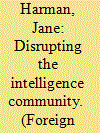

|
|
|
|
|
| Summary/Abstract |
Some 40 years have passed since the Church Committee’s sweeping investigation of U.S. intelligence practices, fresh on the heels of the Watergate scandal. And ten years have gone by since the last major reorganization of the country’s spy agencies, enacted in the wake of 9/11. Both efforts led to a host of reforms—among them, the creation of the Senate and House Intelligence Committees, the passage of the Foreign Intelligence Surveillance Act (FISA), and the adoption of the Intelligence Reform and Terrorism Prevention Act, which I helped shepherd through Congress.
|
|
|
|
|
|
|
|
|
|
|
|
|
|
|
|
| 4 |
ID:
137573


|
|
|
|
|
| Summary/Abstract |
Americans tend to think of affirmative action as a uniquely American institution: an outgrowth of the civil rights movement, intended primarily to improve economic opportunities for African Americans, who have continued to face obstacles to equality long after the Jim Crow era of segregation and overt discrimination. And it is true that as part of the Civil Rights Act of 1964, the U.S. government began to implement affirmative action policies.
|
|
|
|
|
|
|
|
|
|
|
|
|
|
|
|
| 5 |
ID:
137568


|
|
|
|
|
| Summary/Abstract |
In 1992, the Nobel Committee awarded its Peace Prize to Rigoberta Menchú Tum, the daughter of poor Guatemalan peasants, for her work promoting indigenous rights. Her prize, momentous in its own right, highlighted a sea change in Latin American politics. Throughout the 1980s and early 1990s, prominent indigenous movements had emerged in countries such as Bolivia, Ecuador, Guatemala, and Mexico. As a result, Latin American countries undertook unprecedented reforms to address ethnic diversity: politicians amended national constitutions to recognize indigenous people, passed laws supporting bicultural education and affirmative action, and added questions about race and ethnicity to official censuses.
|
|
|
|
|
|
|
|
|
|
|
|
|
|
|
|
| 6 |
ID:
137567
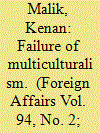

|
|
|
|
|
| Summary/Abstract |
Thirty years ago, many Europeans saw multiculturalism—the embrace of an inclusive, diverse society—as an answer to Europe’s social problems. Today, a growing number consider it to be a cause of them. That perception has led some mainstream politicians, including British Prime Minister David Cameron and German Chancellor Angela Merkel, to publicly denounce multiculturalism and speak out against its dangers. It has fueled the success of far-right parties and populist politicians across Europe, from the Party for Freedom in the Netherlands to the National Front in France. And in the most extreme cases, it has inspired obscene acts of violence, such as Anders Behring Breivik’s homicidal rampage on the Norwegian island of Utoya in July 2011.
|
|
|
|
|
|
|
|
|
|
|
|
|
|
|
|
| 7 |
ID:
137579
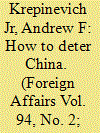

|
|
|
|
|
| Summary/Abstract |
In the U.S. military, at least, the “pivot” to Asia has begun. By 2020, the navy and the air force plan to base 60 percent of their forces in the Asia-Pacific region. The Pentagon, meanwhile, is investing a growing share of its shrinking resources in new long-range bombers and nuclear-powered submarines designed to operate in high-threat environments.
|
|
|
|
|
|
|
|
|
|
|
|
|
|
|
|
| 8 |
ID:
137581


|
|
|
|
|
| Summary/Abstract |
After 9/11, many within the U.S. national security establishment worried that, following decades of preparation for confronting conventional enemies, Washington was unready for the challenge posed by an unconventional adversary such as al Qaeda. So over the next decade, the United States built an elaborate bureaucratic structure to fight the jihadist organization, adapting its military and its intelligence and law enforcement agencies to the tasks of counterterrorism and counterinsurgency.
|
|
|
|
|
|
|
|
|
|
|
|
|
|
|
|
| 9 |
ID:
137576
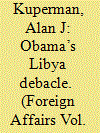

|
|
|
|
|
| Summary/Abstract |
On March 17, 2011, the UN Security Council passed Resolution 1973, spearheaded by the administration of U.S. President Barack Obama, authorizing military intervention in Libya. The goal, Obama explained, was to save the lives of peaceful, pro-democracy protesters who found themselves the target of a crackdown by Libyan dictator Muammar al-Qaddafi. Not only did Qaddafi endanger the momentum of the nascent Arab Spring, which had recently swept away authoritarian regimes in Tunisia and Egypt, but he also was poised to commit a bloodbath in the Libyan city where the uprising had started, said the president. “We knew that if we waited one more day, Benghazi—a city nearly the size of Charlotte—could suffer a massacre that would have reverberated across the region and stained the conscience of the world,” Obama declared. Two days after the UN authorization, the United States and other NATO countries established a no-fly zone throughout Libya and started bombing Qaddafi’s forces. Seven months later, in October 2011, after an extended military campaign with sustained Western support, rebel forces conquered the country and shot Qaddafi dead.
|
|
|
|
|
|
|
|
|
|
|
|
|
|
|
|
| 10 |
ID:
137589
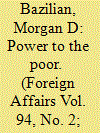

|
|
|
|
|
| Summary/Abstract |
Imagine life without electricity. With no lights, electric stove, or water pump, you must travel miles to fetch water and firewood, running a particular risk of attack if you are a girl or a woman. At home, you cook over a smoky stove or an open fire, raising your odds of getting lung and heart disease. If you are pregnant, you may die in the dark, giving birth at a clinic that lacks air conditioning and modern medical equipment. Without vaccines, which require refrigeration, your children remain vulnerable to deadly diseases. At night, they study by the light of a kerosene lamp, which causes burns when the fuel spills. Earning a living isn’t easy, either. No electricity means no sewing machines or rice mills, no pumps for irrigating crops, and no way to keep drinks cold or keep a store open at night. The lack of power keeps away bigger companies that might have hired you.
|
|
|
|
|
|
|
|
|
|
|
|
|
|
|
|
| 11 |
ID:
137565


|
|
|
|
|
| Summary/Abstract |
In 1900, in his “Address to the Nations of the World” at the first Pan-African Conference, in London, W. E. B. Du Bois proclaimed that the “problem of the twentieth century” was “the problem of the color-line, the question as to how far differences of race—which show themselves chiefly in the color of the skin and the texture of the hair—will hereafter be made the basis of denying to over half the world the right of sharing to their utmost ability the opportunities and privileges of modern civilization.
|
|
|
|
|
|
|
|
|
|
|
|
|
|
|
|
| 12 |
ID:
137566
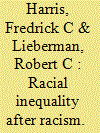

|
|
|
|
|
| Summary/Abstract |
Last summer, the killings of two unarmed African American men—Eric Garner in Staten Island, New York, and Michael Brown in Ferguson, Missouri—by white police officers reignited the national conversation about racial inequality in the United States. In both cases, grand juries declined to indict the officers involved. The rulings provoked a wave of protest marches, rallies, and road blockades across the country, as demonstrators of all skin colors proclaimed to the nation and to the world that “black lives matter.
|
|
|
|
|
|
|
|
|
|
|
|
|
|
|
|
| 13 |
ID:
137586


|
|
|
|
|
| Summary/Abstract |
Solar power has been declared a winner before, only to flounder. It’s easy to remain skeptical today, given that solar power accounts for less than one percent of the global energy supply. But it is also expanding faster than any other power source, with an average growth rate of 50 percent a year for the past six years. Annual installations of photovoltaic panels increased from a capacity of less than 0.3 gigawatts in 2000 to 45 gigawatts in 2014—enough to power more than 7.4 million American homes. This time really is different: solar power is ready to compete on its own terms.
|
|
|
|
|
|
|
|
|
|
|
|
|
|
|
|
| 14 |
ID:
137588


|
|
|
|
|
| Summary/Abstract |
The U.S. electrical grid has hardly changed since the War of Currents, the 1880s fight that saw George Westinghouse’s alternating current triumph over Thomas Edison’s direct current as the preferred method for generating and transmitting electricity. It remains a network of long-distance transmission and distribution lines designed to move electricity in one direction: from giant, lumbering fossil fuel plants to faraway households and businesses. This system has endured because it has proved safe, reliable, effective, and affordable.
|
|
|
|
|
|
|
|
|
|
|
|
|
|
|
|
|
|
|
|
|